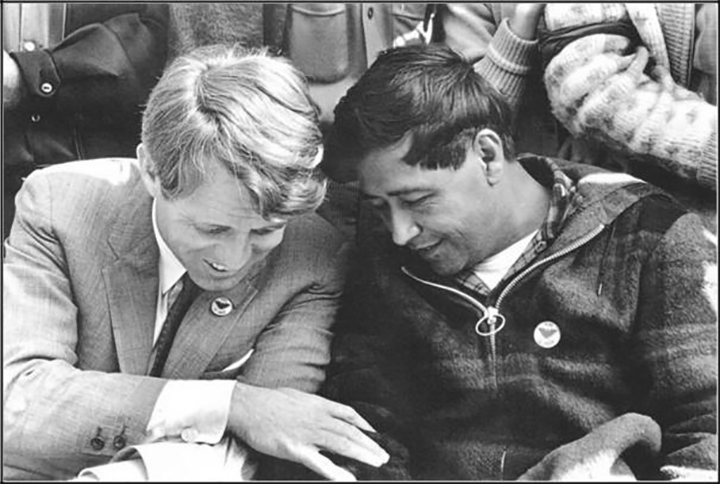
City, State & National Civil Rights Leaders Commemorate 50th Anniversary of Milestone in Civil Rights History
Paul Chavez, Kerry Kennedy, Arturo Rodriguez, Paul Schrade, Dolores Huerta & Monica Garcia to Lead Celebration
March 5th Event at Los Angeles’ RFK Community Schools, Serving Mostly Immigrant Students, Who Will Learn of Watershed Event Linking Two Iconic Figures in History LOS ANGELES — Mar. 5, 2018 — For Immediate Release — Los Angeles, California and national civil rights leaders are coming together to commemorate one of the most iconic events in the history of the Latino civil and labor rights movement, it was announced today by the organizations hosting the event, the Cesar Chavez Foundation and Robert F. Kennedy Human Rights.
The event – honoring the late Cesar Chavez, one of the most iconic Latino civil rights leaders in U.S. history, and the late Senator Robert F. Kennedy, a champion of civil rights and the poor who fervently embraced Chavez’s nonviolent cause – will be held at Robert F. Kennedy Community Schools on the former site of the Ambassador Hotel where Kennedy was assassinated and that now serves primarily low-income, immigrant children.
March 31 is Cesar Chavez Day (his birthday), celebrated as a state holiday in California and a number of other states. March 10 is the 50th anniversary of the end of Chavez’s 25-day, water-only fast that threatened his life. On its final day in Delano, Calif., in 1968, he was joined by Senator Kennedy, who called Chavez “one of the heroic figures of our time.” Today, Chavez’s name is synonymous with the struggle for justice by American farm workers and dignity for the nation’s poor.
Joining RFK Schools students participating in the program are Kerry Kennedy, RFK’s daughter and president of Robert F. Kennedy Human Rights, an international human rights organization; Paul F. Chavez, Cesar’s son and president of the Cesar Chavez Foundation; UFW President Arturo S. Rodriguez, Chavez’s successor; former labor leader Paul Schrade, who brought Robert Kennedy to Delano and was seriously wounded when RFK was killed; and farm labor and civil rights leader Dolores Huerta, who was also with Senator Kennedy that night.
Part of the presentation will be a panel discussion about today’s meaning in a shifting climate – moderated by L.A. School Board President Mónica García – with the “future generation” of the movement, including Julie Chavez Rodriguez, granddaughter of Cesar Chavez, current state director for Senator Kamala Harris and former top White House aide to President Obama; Georgia Kennedy-Bailey, granddaughter of RFK; and two students from RFK Schools who are immigrants, Wendy Garcia-Torres, originally from Central America, and Sumaiya Sabnam, originally from Bangladesh.
Also featured will be a photo exhibit chronicling the 1968 fast and the Chavez-Kennedy relationship.
Photo Credit: George Ballis-Take Stock
“They came from very different worlds, but Robert Kennedy and my father forged a close personal bond,” says Paul Chavez, Chavez Foundation president. “They were about the same age, had large families, were devoutly Catholic and deeply committed to serving others, with an abiding faith in the basic goodness of the American people.”
“There was no quality Robert Kennedy admired more than courage,” recalls his daughter Kerry Kennedy, president of Robert F. Kennedy Human Rights. “My mother [Ethel] says my father told her Cesar was the most moral man he knew.”
WHO: Paul Chavez, Kerry Kennedy, Paul Schrade, Arturo Rodriguez, Dolores Huerta & Mónica García
WHAT: 50th Anniversary Commemoration & Panel
WHEN: Monday, March 5; 10 a.m. presentation and panel; lunch reception at 12 p.m. Press interviews available prior to program (9:15-10 a.m.) and at the reception
WHERE: Robert F. Kennedy Community Schools, Cocoanut Grove Auditorium/Paul Schrade Library (reception) 701 S. Catalina St., Los Angeles (@ Wilshire), former grounds of the Ambassador Hotel
PRESS PARKING: Catalina Street gate entrance
About Cesar Chavez: Born in 1927 on the small farm his grandfather homesteaded outside Yuma, Ariz., Chavez became a migrant farm worker with his family in California during the 1930s and ‘40s, quitting school after the eighth grade to work full time in the fields. After serving in the U.S. Navy just after World War II, he became a community organizer in 1952 with the Community Service Organization, which he helped turn into the Southwest’s most effective Latino civil rights group of the ‘50s and early ‘60s. With his wife, Helen, Dolores Huerta and other early organizers, Chavez began building what became the United Farm Workers in 1962. Three years later, his union joined a strike begun by Filipino grape workers in Delano, Calif., which lasted five years and rallied millions to their cause with an international table grape boycott. Two-and-a-half years into the strike, Chavez conducted a 25 -day, water-only fast to rededicate the grape strikers to nonviolence. Chavez lost 35 pounds and doctors warned his life was in danger. The fast ended 50 years ago on March 10, 1968, during an outdoor Catholic mass at a Delano park attended by thousands of farm workers and supporters. A weakened Chavez, supported by two men, was joined by U.S. Senator Robert F. Kennedy just five days before he announced his presidential candidacy and three months before the senator’s assassination. A second grape strike and boycott convinced Governor Jerry Brown and lawmakers to pass the California Agricultural Labor Relations Act of 1975, the first law in the nation granting farm workers the right to organize and bargain. Chavez led numerous strikes, boycotts, marches and political campaigns during the 31 years he led the UFW. His last and longest public fast of 36 days was in Delano in 1988 over the pesticide poisoning of farm workers and their children. Since his passing at age 66 in 1993, countless public places have been named in his honor and thousands of annual commemorations are held, especially around his March 31 birthday. More than 50,000 people attended his funeral services in the small town of Delano, the same community where he had planted his seeds of social justice decade before.
# # #
